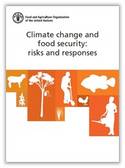Climate change and food security: risks and responses
 By adopting the sustainable development goals, the world has committed to ending hunger, achieving food security and improving nutrition by 2030. But climate change is already undermining the livelihoods and food security of the most vulnerable populations. Ensuring food security and good nutrition in the face of climate change is among the most daunting challenges facing humankind. The report Climate change and food security: risks and responses brings together evidence from the Intergovernmental Panel on Climate Change (IPCC), updated by the latest evidence and scientific findings as well as by results from experience on the ground, on the impacts of climate change on food security and nutrition. It shows how a cascade of impacts from ecosystems to livelihoods interacts with a series of vulnerabilities, undermining food security and nutrition, especially of the most vulnerable populations. The report presents ways to adapt, to reduce vulnerabilities and to build resilience to climate change. It shows the importance of acting now to address climate change, to ensure food security and good nutrition for all, now and in the future.
By adopting the sustainable development goals, the world has committed to ending hunger, achieving food security and improving nutrition by 2030. But climate change is already undermining the livelihoods and food security of the most vulnerable populations. Ensuring food security and good nutrition in the face of climate change is among the most daunting challenges facing humankind. The report Climate change and food security: risks and responses brings together evidence from the Intergovernmental Panel on Climate Change (IPCC), updated by the latest evidence and scientific findings as well as by results from experience on the ground, on the impacts of climate change on food security and nutrition. It shows how a cascade of impacts from ecosystems to livelihoods interacts with a series of vulnerabilities, undermining food security and nutrition, especially of the most vulnerable populations. The report presents ways to adapt, to reduce vulnerabilities and to build resilience to climate change. It shows the importance of acting now to address climate change, to ensure food security and good nutrition for all, now and in the future.
Related Content
- Policy study on re-calibrating institutions for climate action
- Advancing gender equality in Asia and the Pacific in the context of climate change
- The hidden wealth of nations: the economics of groundwater in times of climate change
- Climate investment opportunities in India's cooling sector
- WFP Global Update on COVID-19: November 2020- growing needs, response to date and what’s to come in 2021
- Responding to COVID-19: CGIAR’s contribution to global response, recovery and resilience
